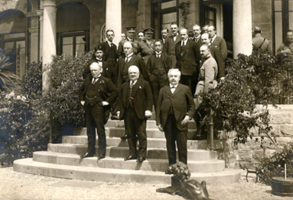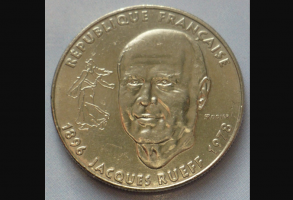John D. Mueller
The Lehrman Institute Fellow in Economics
John D. Mueller is the Lehrman Institute Fellow in Economics and Director of the Economics and Ethics Program at the Ethics and Public Policy Center. Mr. Mueller specializes in the relation of modern economic theory to its Judeo-Christian and Greco-Roman origins, its practical application to personal, family, and political economy, and the interaction of economics, philosophical worldviews, and religious faith. He is also an adjunct senior research fellow at the Social Futuring Center.
John D. Mueller is the Lehrman Institute Fellow in Economics and Director of the Economics and Ethics Program at the Ethics and Public Policy Center. Mr. Mueller specializes in the relation of modern economic theory to its Judeo-Christian and Greco-Roman origins, its practical application to personal, family, and political economy, and the interaction of economics, philosophical worldviews, and religious faith. He is also an adjunct senior research fellow at the Social Futuring Center.
Mr. Mueller retired in January 2015 as president of LBMC LLC, a firm in Washington, D.C. specializing in economic and financial-market forecasting and economic policy analysis. He has more than 35 years’ experience in those fields. Besides investment managers, Mr. Mueller has advised many American and foreign economic policymakers on monetary policy and exchange rates, policies for reducing unemployment, and income-tax, welfare and Social Security reform. He is author of Redeeming Economics: Rediscovering the Missing Element (ISI Books, 2010; updated paperback, 2014). From 1979 through 1988, Mr. Mueller was economist and speechwriter to then-Congressman Jack Kemp, mostly as Economic Counsel to the House Republican Conference (caucus) of which Kemp was chairman. In that capacity he drafted bills originating some key features of President Ronald Reagan’s tax cuts of 1981 and Tax Reform Act of 1986 and of Kemp’s 1988 presidential campaign. Mr. Mueller graduated in 1974 from Haverford College, and after his children completed their education, received his master’s degree in applied economics in 2019 from the University of Maryland, and in 2020 became a doctoral candidate in economics of Corvinus University in Budapest.
***
View a video on a special issue of the Society and Economy Journal, featuring commentary from Mr. Mueller:
- with Hungarian subtitles: https://youtu.be/6alU4PA0kYY
- with Chinese subtitles: https://youtu.be/8gOgrMnh19w
***
Reviews of John D. Mueller’s Redeeming Economics: Rediscovering the Missing Element, ISI Books, Wilmington, DE, 2014 [2010]
Kevin D. Williamson, “Summa Economica,” National Review, October 18, 2010, Issue
William E. Dean, Journal of Interdisciplinary Studies, XXIII, 2011: 207-209 (PDF)
David Colander, Middlebury College, Journal of Economic Literature: Vol. 49 No. 3 – Book Review, JEL 2011–0025 (Abstract | PDF)
Joseph Lawler, “A Review of Redeeming Economics,” First Things, January 2011
Kevin Clark, “Redeeming Economics” (PDF)
Ryan T. Anderson, “Dismal Science Redeemed: What’s Gone Wrong,” The Public Discourse, May 4, 2011; “Dismal Science Redeemed: Where to Go from Here,” May 6, 2011
Troy Gibson, “Redeeming Economics, a review,” The Reformed Mind, 23 June 2011
J. Daniel Hammond, Wake Forest University, Faith and Economics, 59 (Spring 2012): 73-77
Rev. James V. Schall, S.J., “Economics—When the Truth Really Matters,” Aleteia, November 22, 2014
- See also “Schall’s List of Longer Books to Keep Sane By,” on which Redeeming Economics appears
James M. Kushiner, “The Wealth of Families: The Realization of Adam Smith,” Touchstone, February 22, 2019
***
Peer-Reviewed Journal Articles and Submissions
Social Futuring, Modern and Ancient (PDF)
Submitted to World Futures: The Journal Of New Paradigm Research
Rueff’s Laws of Unemployment and Inflation (PDF)
Submitted to Theoretical Economics
Published in American Governance (2016)
Published in American Governance (2016)
Published in Quarterly Journal of Austrian Economics 18, no. 2 (Summer 2015)
The ‘Missing Element’ in Modern Economics
Published in Quarterly Journal of Austrian Economics 18, no. 2 (Summer 2015)
Mueller, J. (2013), “Mueller’s redeeming economics”, A Research Annual (Research in the History of Economic Thought and Methodology, Vol. 31A), Emerald Group Publishing Limited, pp. 109-118.
Mueller, J. (2013), “Mueller’s redeeming economics”, A Research Annual (Research in the History of Economic Thought and Methodology, Vol. 31A), Emerald Group Publishing Limited, pp. 109-118.
Published in Journal of Markets and Morality 14, no. 2 (2011)
How Does Fiscal Policy Affect the American Worker?
Published in The Notre Dame Journal of Law Ethics and Public Policy (Vol. 20, No. 2, Spring 2006, pp. 563-619) (2006)
***
AAA Index
The AAA Index, or Index of Human Flourishing (IHF)
Presented at 17th Annual Conference, Doctoral School of Economics, Business and Informatics, Corvinus University Budapest
Social Futuring, Modern and Ancient
John D. Mueller

This article reviews and compares two approaches to the new, holistic, and multidisciplinary concept “Social Futuring,” which are expressed in two indices based on this concept, entitled the “Social Futuring Index” and the “Human Flourishing Index” (HFI). Broadly speaking, the Social Futuring Index is indebted to the broader context of modern social sciences, while the Human Flourishing Index attempts to update the scholastic moral philosophy, which was based primarily on the insights of Aristotle and Augustine, as combined by Thomas Aquinas (hence the HFI was previously called the “AAA Index”). Finally, we present the key elements of both indices and their measurement for individual countries from a comparative perspective.
Articles
World Futures / May 18, 2022
Atheism: Pro and Con
John D. Mueller

John D. Mueller answers atheist Jeffery Lowder’s recycling of Plato’s argument against religion and morality and Lowder’s defense of atheism.
Articles
Academia.edu / March 28, 2022
Time to Reverse the Curse Over the Dollar
John D. Mueller

Other countries backing their currencies with dollar-denominated securities led to a dilemma for America. U.S. manufacturing jobs have disappeared in direct proportion to the decline in our net reserves.
Articles
The New York Sun / August 5, 2021
Sexual Healing
John D. Mueller

Jennifer Roback Morse’s The Sexual State provides a comprehensive, well-documented analysis of the Sexual Revolution and outlines what seems to be a more livable and politically viable alternative.
Articles
Claremont Review of Books / June 13, 2019
Why Public-Assistance Programs Should Have More Stringent Work Mandates
John D. Mueller

It is natural to feel compassion for those less fortunate than we are. But benefits should be concentrated in programs that have the least disincentive effect to recipients’ employment in the labor market. Work, after all, leads to both higher incomes and greater human dignity.
Articles
CQ Researcher / January 11, 2019
Don’t Make America Great Britain
John D. Mueller

Donald Trump promised to “make America great again,” but he might make America Great Britain. To re-industrialize the U.S. economy, President Trump must avoid the mistake that de-industrialized Britain: namely, he must end the dollar’s role as the world’s chief reserve currency.
Articles
The Wall Street Journal / October 11, 2018
The Cause and Mechanisms of American De-Industrialization
John D. Mueller

An effective solution to the decline of American manufacturing highlighted in the new book Advanced Manufacturing, it seems, requires either a change of mind by President Trump, or a different president.
Articles
Law and Liberty / September 6, 2018
Jeff Bell Was George Bailey
John D. Mueller

To those who knew him well, Jeffrey L. Bell was a real-life George Bailey: an accomplished and decent man who shaped important events by helping others achieve their own greatness, mostly without recognition himself.
Articles
The Weekly Standard / February 20, 2018



